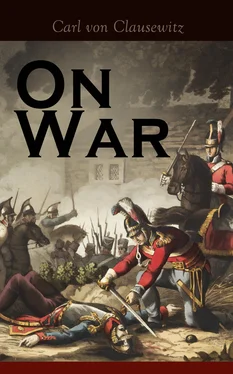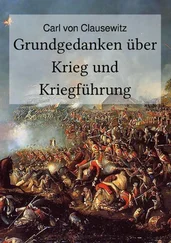1 ...6 7 8 10 11 12 ...48 Yet every War would necessarily resolve itself into a single solution, or a sum of simultaneous results, if all the means required for the struggle were raised at once, or could be at once raised; for as one adverse result necessarily diminishes the means, then if all the means have been applied in the first, a second cannot properly be supposed. All hostile acts which might follow would belong essentially to the first, and form, in reality only its duration.
But we have already seen that even in the preparation for War the real world steps into the place of mere abstract conception—a material standard into the place of the hypotheses of an extreme: that therefore in that way both parties, by the influence of the mutual reaction, remain below the line of extreme effort, and therefore all forces are not at once brought forward.
It lies also in the nature of these forces and their application that they cannot all be brought into activity at the same time. These forces are the armies actually on foot, the country , with its superficial extent and its population, and the allies .
In point of fact, the country, with its superficial area and the population, besides being the source of all military force, constitutes in itself an integral part of the efficient quantities in War, providing either the theatre of war or exercising a considerable influence on the same.
Now, it is possible to bring all the movable military forces of a country into operation at once, but not all fortresses, rivers, mountains, people, &c.—in short, not the whole country, unless it is so small that it may be completely embraced by the first act of the War. Further, the co-operation of allies does not depend on the Will of the belligerents; and from the nature of the political relations of states to each other, this co-operation is frequently not afforded until after the War has commenced, or it may be increased to restore the balance of power.
That this part of the means of resistance, which cannot at once be brought into activity, in many cases, is a much greater part of the whole than might at first be supposed, and that it often restores the balance of power, seriously affected by the great force of the first decision, will be more fully shown hereafter. Here it is sufficient to show that a complete concentration of all available means in a moment of time is contradictory to the nature of War.
Now this, in itself, furnishes no ground for relaxing our efforts to accumulate strength to gain the first result, because an unfavourable issue is always a disadvantage to which no one would purposely expose himself, and also because the first decision, although not the only one, still will have the more influence on subsequent events, the greater it is in itself.
But the possibility of gaining a later result causes men to take refuge in that expectation, owing to the repugnance in the human mind to making excessive efforts; and therefore forces are not concentrated and measures are not taken for the first decision with that energy which would otherwise be used. Whatever one belligerent omits from weakness, becomes to the other a real objective ground for limiting his own efforts, and thus again, through this reciprocal action, extreme tendencies are brought down to efforts on a limited scale.
9. THE RESULT IN WAR IS NEVER ABSOLUTE.
Lastly, even the final decision of a whole War is not always to be regarded as absolute. The conquered State often sees in it only a passing evil, which may be repaired in after times by means of political combinations. How much this must modify the degree of tension, and the vigour of the efforts made, is evident in itself.
10. THE PROBABILITIES OF REAL LIFE TAKE THE PLACE OF THE CONCEPTIONS OF THE EXTREME AND THE ABSOLUTE.
In this manner, the whole act of War is removed from the rigorous law of forces exerted to the utmost. If the extreme is no longer to be apprehended, and no longer to be sought for, it is left to the judgment to determine the limits for the efforts to be made in place of it, and this can only be done on the data furnished by the facts of the real world by the LAWS OF PROBABILITY. Once the belligerents are no longer mere conceptions, but individual States and Governments, once the War is no longer an ideal, but a definite substantial procedure, then the reality will furnish the data to compute the unknown quantities which are required to be found.
From the character, the measures, the situation of the adversary, and the relations with which he is surrounded, each side will draw conclusions by the law of probability as to the designs of the other, and act accordingly.
11. THE POLITICAL OBJECT NOW REAPPEARS.
Here the question which we had laid aside forces itself again into consideration (see No. 2), viz., the political object of the War. The law of the extreme, the view to disarm the adversary, to overthrow him, has hitherto to a certain extent usurped the place of this end or object. Just as this law loses its force, the political must again come forward. If the whole consideration is a calculation of probability based on definite persons and relations, then the political object, being the original motive, must be an essential factor in the product. The smaller the sacrifice we demand from ours, the smaller, it may be expected, will be the means of resistance which he will employ; but the smaller his preparation, the smaller will ours require to be. Further, the smaller our political object, the less value shall we set upon it, and the more easily shall we be induced to give it up altogether.
Thus, therefore, the political object, as the original motive of the War, will be the standard for determining both the aim of the military force and also the amount of effort to be made. This it cannot be in itself, but it is so in relation to both the belligerent States, because we are concerned with realities, not with mere abstractions. One and the same political object may produce totally different effects upon different people, or even upon the same people at different times; we can, therefore, only admit the political object as the measure, by considering it in its effects upon those masses which it is to move, and consequently the nature of those masses also comes into consideration. It is easy to see that thus the result may be very different according as these masses are animated with a spirit which will infuse vigour into the action or otherwise. It is quite possible for such a state of feeling to exist between two States that a very trifling political motive for War may produce an effect quite disproportionate—in fact, a perfect explosion.
This applies to the efforts which the political object will call forth in the two States, and to the aim which the military action shall prescribe for itself. At times it may itself be that aim, as, for example, the conquest of a province. At other times the political object itself is not suitable for the aim of military action; then such a one must be chosen as will be an equivalent for it, and stand in its place as regards the conclusion of peace. But also, in this, due attention to the peculiar character of the States concerned is always supposed. There are circumstances in which the equivalent must be much greater than the political object, in order to secure the latter. The political object will be so much the more the standard of aim and effort, and have more influence in itself, the more the masses are indifferent, the less that any mutual feeling of hostility prevails in the two States from other causes, and therefore there are cases where the political object almost alone will be decisive.
If the aim of the military action is an equivalent for the political object, that action will in general diminish as the political object diminishes, and in a greater degree the more the political object dominates. Thus it is explained how, without any contradiction in itself, there may be Wars of all degrees of importance and energy, from a War of extermination down to the mere use of an army of observation. This, however, leads to a question of another kind which we have hereafter to develop and answer.
Читать дальше












